跨文化案例选集1
- 格式:doc
- 大小:80.00 KB
- 文档页数:14
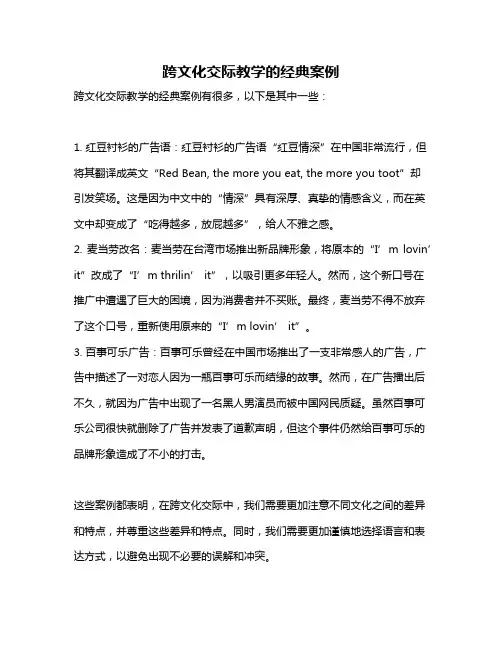
跨文化交际教学的经典案例
跨文化交际教学的经典案例有很多,以下是其中一些:
1. 红豆衬衫的广告语:红豆衬衫的广告语“红豆情深”在中国非常流行,但将其翻译成英文“Red Bean, the more you eat, the more you toot”却
引发笑场。
这是因为中文中的“情深”具有深厚、真挚的情感含义,而在英
文中却变成了“吃得越多,放屁越多”,给人不雅之感。
2. 麦当劳改名:麦当劳在台湾市场推出新品牌形象,将原本的“I’m lovin’ it”改成了“I’m thrilin’ it”,以吸引更多年轻人。
然而,这个新口号在
推广中遭遇了巨大的困境,因为消费者并不买账。
最终,麦当劳不得不放弃
了这个口号,重新使用原来的“I’m lovin’ it”。
3. 百事可乐广告:百事可乐曾经在中国市场推出了一支非常感人的广告,广告中描述了一对恋人因为一瓶百事可乐而结缘的故事。
然而,在广告播出后
不久,就因为广告中出现了一名黑人男演员而被中国网民质疑。
虽然百事可
乐公司很快就删除了广告并发表了道歉声明,但这个事件仍然给百事可乐的
品牌形象造成了不小的打击。
这些案例都表明,在跨文化交际中,我们需要更加注意不同文化之间的差异
和特点,并尊重这些差异和特点。
同时,我们需要更加谨慎地选择语言和表
达方式,以避免出现不必要的误解和冲突。
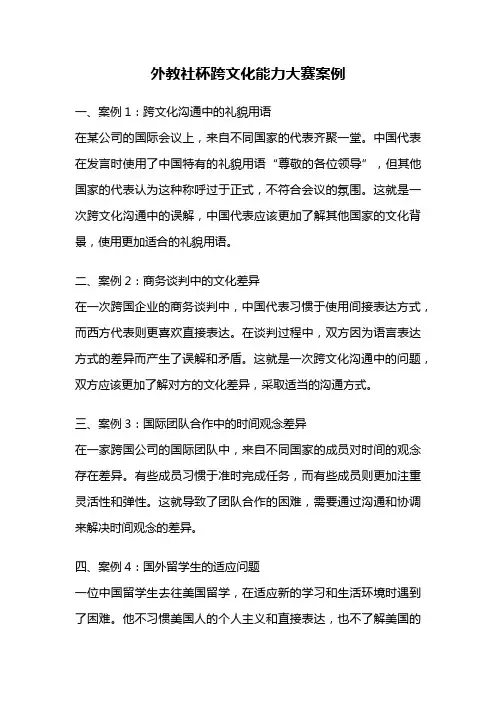
外教社杯跨文化能力大赛案例一、案例1:跨文化沟通中的礼貌用语在某公司的国际会议上,来自不同国家的代表齐聚一堂。
中国代表在发言时使用了中国特有的礼貌用语“尊敬的各位领导”,但其他国家的代表认为这种称呼过于正式,不符合会议的氛围。
这就是一次跨文化沟通中的误解,中国代表应该更加了解其他国家的文化背景,使用更加适合的礼貌用语。
二、案例2:商务谈判中的文化差异在一次跨国企业的商务谈判中,中国代表习惯于使用间接表达方式,而西方代表则更喜欢直接表达。
在谈判过程中,双方因为语言表达方式的差异而产生了误解和矛盾。
这就是一次跨文化沟通中的问题,双方应该更加了解对方的文化差异,采取适当的沟通方式。
三、案例3:国际团队合作中的时间观念差异在一家跨国公司的国际团队中,来自不同国家的成员对时间的观念存在差异。
有些成员习惯于准时完成任务,而有些成员则更加注重灵活性和弹性。
这就导致了团队合作的困难,需要通过沟通和协调来解决时间观念的差异。
四、案例4:国外留学生的适应问题一位中国留学生去往美国留学,在适应新的学习和生活环境时遇到了困难。
他不习惯美国人的个人主义和直接表达,也不了解美国的社交规则。
这就需要他努力适应新的文化环境,学会与他人进行有效的跨文化交流。
五、案例5:外派员工在海外工作中的文化冲突一家公司将一位中国员工派驻到印度工作,他在与印度员工合作时遇到了文化冲突。
他习惯于按照计划和规定进行工作,而印度员工更注重人际关系和灵活性。
这就需要他学会与印度员工进行有效的沟通和合作,解决文化冲突。
六、案例6:国际旅游中的文化差异一对夫妇去日本旅游,在与当地人交流时遇到了困难。
他们不懂得日本的礼仪和习惯,也无法用日语进行简单的交流。
这就需要他们学习一些基本的日本礼仪和日语,以便更好地融入当地文化。
七、案例7:外国人在中国的就业问题一位外国人在中国找工作时遇到了困难。
他不懂得中国的求职规则和面试技巧,也无法流利地用中文进行交流。
这就需要他学习一些中国的文化和语言知识,提高自己的跨文化能力。
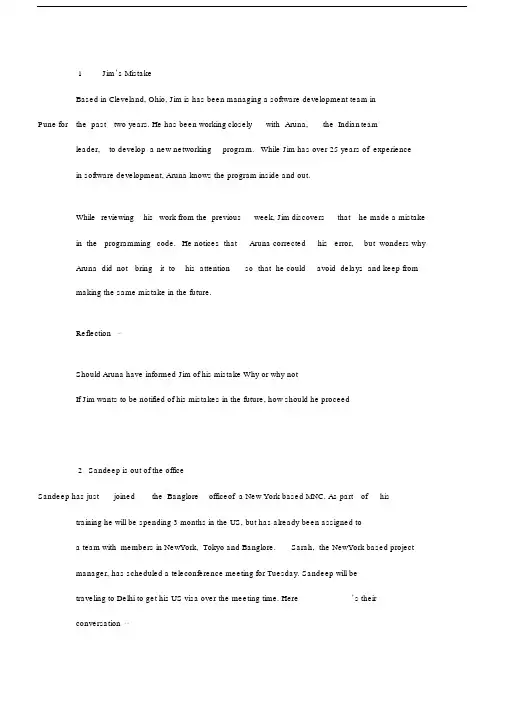
1Jim’s MistakeBased in Cleveland, Ohio, Jim is has been managing a software development team inPune for the past two years. He has been working closely with Aruna, the Indian team leader, to develop a new networking program. While Jim has over 25 years of experiencein software development, Aruna knows the program inside and out.While reviewing his work from the previous week, Jim discovers that he made a mistake in the programming code.He notices that Aruna corrected his error,but wonders why Aruna did not bring it to his attention so that he could avoid delays and keep frommaking the same mistake in the future.Reflection⋯Should Aruna have informed Jim of his mistake Why or why notIf Jim wants to be notified of his mistakes in the future, how should he proceed2 Sandeep is out of the officeSandeep has just joined the Banglore office o f a New York based MNC. As part of his training he will be spending 3 months in the US, but has already been assigned toa team with members in NewYork, Tokyo and Banglore. Sarah, the NewYork based projectmanager, has scheduled a teleconference meeting for Tuesday. Sandeep will betraveling to Delhi to get his US visa over the meeting time. Here’s theirconversation ⋯Sarah: Can we do the teleconference tomorrow,7 pm for you, or should we wait until you get backSandeep: Better if we can wait, but I can do it if you like–if it’s necessary. Sarah: Do you want to postpone it Tell me, yes or noReflection⋯What cultural and/or personality traits are influencing the communicationWhat is Sarah likely to be thinking/feelingWhat is Sandeep likely to be thinking/feeling3. PromotionMayank has been working as an Information Officer at a foreign consulate in NewDelhi for several years. His boss, Hendrick, wants to reward Mayank for his hard work and offers him a promotion and pay raise to become an Information Clerk. Mayank politely declines the offer, leaving Hendrick confused.4.And Also Meet with OthersMark is an American living in Delhi and is meeting with Ajay, who is a governmentofficial that frequently deals with the public. Mark is interested in forming apartnership with Suresh, a local businessman with whomAjay has worked in the past. Mark wants to know if Ajay thinks partnering with Suresh is a good idea.Mark: Do you happen to know SureshAjay: Of course, I have worked closely with him on a number of projects over thepast 10 years. I know him very well.Mark: I was thinking about meeting him and seeing if there might be a possibilityfor collaboration. What do you thinkAjay: Yes, you should meet with him, and you should also meet with others.Mark: Thanks. Who else should I meet withAjay:You know there are some girls who fall in love with a boy who is very popular, well dressed,and good looking. After they get married,they realize that they made a mistake because the boy has no substance. Other girls will look for a guy withgood character–checking out his family situation and talking with his friendsabout him. When she gets married,she is much happier than the girl who married the popular guy.Reflection:Should Mark meet with Suresh Why or why notWhy does Mark ask about other people to meet withWhy does Ajay talk about a hypothetical marriage5.Two men meet on a plane from Tokyo to Hong Kong. Chu Hon-fei is a Hong Kongexporter who is returning from a business trip to Japan. Andrew Richardson is anAmerican buyer on his first business trip to Hong Kong. It Is a convenient meetingfor them because Mr. Chu ’s company sells some of the products Mr. Richardson hassome to Hong Kong to buy. After a bit of conversation they introduce themselves toeach other.’m Andrew Richardson. My friends call me Andy.Mr. Richardson: By the way, IThis is my business card.Mr. Chu: I ’m David Chu. Pleased to meet you, Mr. Richardson. This is my card.Mr. Richardson: No, no. Call me Andy. I think we’ll be doing a lot of business together.Mr. Chu: Yes, I hope so.Mr. Richardson (reading Mr. Chu’s card ) : Chu, Hon-fei.Hon-fei, I ’ll give you a call tomorrow as soon as I get settled at my hotel.Mr Chu (smiling): Yes, I’ll expect your call.When these two men separate,they leave each other with very different impressions of the situation. Mr. Richardson is very pleased to have made theacquaintance of Mr. Chu and feels they have gotten off to a very good start. Theyhave established their relationship on a first-name basis and Mr. Chu’s smile seems to indicate that he will be friendly and easy to do business with. Mr. Richardsonis very particularly pleased that he has treated Mr. Chu with respect for his Chinese background by calling him Hon-fei rather than using t he western name, David,which seems to him an unnecessary imposition of western culture.In contrast, Mr. Chu feels quite uncomfortable with Mr. Richardson. He feelsit will be difficult to work with him, and that Mr. Richardson might be ratherinsensitive to cultural differences.He is particularly bothered that Mr. Richardson used his given name, Hon-fei, instead of either David or Mr. Chu.How do you account for their different impressions Does culture play a rolein the communication between these two men6. . A letter to a columnist:Dear Mary,We work in the typing pool of a large London store and are very concerned forthe welfare of one of our young colleagues.She is only 19, unmarried, and has become very friendly with a young man whoworks in one of the departments of the store. He pops into the typing pool to seeher and there. We know that he is engaged to a girl who lives near him.Wefeel for the protection of the girl,that we should complain to the general manager. But we wouldn’t like anybody to get the sack.Four Worried TypistsThe answer from the columnist:My advice is simple: Mind your own business. The girl is old enough to know what she is doing.Reflection :What value can we see behind the letter and answer7.As a foreign student at the University of Wisconsin in Madison, Keiko Iharawas on a strict budget. She had all her tuition and books paid for by scholarshipsand grants and until recently was comfortably housed in the dormitory, she found asmall apartment to share with a friend. Her college friends, knowing of her situation,offered to round up some of the necessary items for apartment living. Keiko politelydeclined, saying she could manage. Wanting to help out her friendsfound some old but still usable household appliances and furniture.Mary had an old desk that was in her garage. Ed had some chairs from his uncle, and Joe and Marionhad a few extra dishes.They cheerfully brought them over one day. Keiko seemed very embarrassed, but gracefully accepted them, sincerely and profusely thanked them.The following week they were each presented with a gift from Keiko. Mary got anornate jewelry box, Ed a volume of woodcuts by a famous Japanese artist, and Joeand Marion a beautiful Japanese case, all of which were of considerable worth andvalue, much more than the old things they had donated to her. They all protestedthat she could not afford to give such elaborate gifts;they really expected nothing as the household items were not really being used and they would rather have heruse them. Keiko,however,insisted that they take the gifts.In the end, they accepted the gifts,although they all felt uncomfortable as they knew she was really sacrificing to give them.Relection1)What do you think of Keiko insisting on giving valuable gifts to her collegefriends2)How would you feel if Keiko presented you with a gift for your help7. A famous Chinese actress married a German. One day when she was acting, her husbandwas there watching, saying again and again that she was the best actress. Theactress ’ colleagues present asked her af terwards his own wife like that in public.On learning this, wrong.to tell her husband not to praise the German wondered what he didOnce the actress and her husband were talking with their Chinese friends at aparty. Her husband politely praised a Chines e lady on her beauty. The lady ’s husband said that his wife was moderately good looking when young, but now she was old andno longer so. The lady nodded in agreement with a smile. The actress’ husband wassurprised.Discuss why the German was confused in the first situation and surprisedin the second.8. Jose and Jim worked together in a restaurant.They had become friendly becauseboth of them were also studying. Jim was studying business, and Jose was takingEnglish classes and planned to study engineering.One day, as they were leaving work, Jim asked Jose,“Jose, I need a favor. I have to go over to school, and I’m out of money. Could you lend me a dollar so Ican take the bus over there and then get home I’ll pay you back tomorrow.”“Sure,Jim. No problem. You don’t have to pay me back, ” said Jose, as he handed Jim a dollar.As soon as he got out to work the next day, Jim went over to Jose and handed hima dollar, saying,“ Thanks, Jose. I really appreciated this last night. It surewas too cold to walk. ”“Forget it,” said Jose, as he handed Jim back his dollar.“Oh, no, I insist. I don’t want to take advantage of a friend. What if I needto borrow money again sometime If I didn’t pay you back now, I would feel wrongasking to borrow money again,” said Jim, as he put the dollar into Jose’s shirt pocket.Jose answered,“But that’s what friends are for.In Spanish,We have a saying,‘today for you, tomorrow for me.’ If you pay me back, I will feel that I won be able’tto ask you for money when I need it. I will feel like you are closing the door on me,that there is no trust between us. I thought we were friends. How canI take the money” Jose handed back the dollar.“But I won’t feel right if you don’t take it!”said Jim.Questions:1) Why did Jim insist on returning the dollar to Jose2) What cultural values are reflected in Jim’s and Jose’s attitudes。
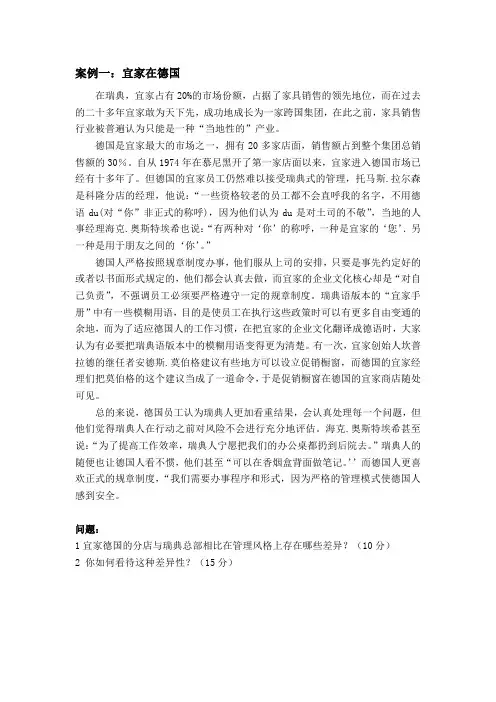
案例一:宜家在德国在瑞典,宜家占有20%的市场份额,占据了家具销售的领先地位,而在过去的二十多年宜家敢为天下先,成功地成长为一家跨国集团,在此之前,家具销售行业被普遍认为只能是一种“当地性的”产业。
德国是宜家最大的市场之一,拥有20多家店面,销售额占到整个集团总销售额的30%。
自从1974年在慕尼黑开了第一家店面以来,宜家进入德国市场已经有十多年了。
但德国的宜家员工仍然难以接受瑞典式的管理,托马斯.拉尔森是科隆分店的经理,他说:“一些资格较老的员工都不会直呼我的名字,不用德语du(对“你”非正式的称呼),因为他们认为du是对土司的不敬”,当地的人事经理海克.奥斯特埃希也说:“有两种对‘你’的称呼,一种是宜家的‘您’.另一种是用于朋友之间的‘你’。
”德国人严格按照规章制度办事,他们服从上司的安排,只要是事先约定好的或者以书面形式规定的,他们都会认真去做,而宜家的企业文化核心却是“对自己负责”,不强调员工必须要严格遵守一定的规章制度。
瑞典语版本的“宜家手册”中有一些模糊用语,目的是使员工在执行这些政策时可以有更多自由变通的余地,而为了适应德国人的工作习惯,在把宜家的企业文化翻译成德语时,大家认为有必要把瑞典语版本中的模糊用语变得更为清楚。
有一次,宜家创始人坎普拉德的继任者安德斯.莫伯格建议有些地方可以设立促销橱窗,而德国的宜家经理们把莫伯格的这个建议当成了一道命令,于是促销橱窗在德国的宜家商店随处可见。
总的来说,德国员工认为瑞典人更加看重结果,会认真处理每一个问题,但他们觉得瑞典人在行动之前对风险不会进行充分地评估。
海克.奥斯特埃希甚至说:“为了提高工作效率,瑞典人宁愿把我们的办公桌都扔到后院去。
”瑞典人的随便也让德国人看不惯,他们甚至“可以在香烟盒背面做笔记。
’’而德国人更喜欢正式的规章制度,“我们需要办事程序和形式,因为严格的管理模式使德国人感到安全。
问题:1宜家德国的分店与瑞典总部相比在管理风格上存在哪些差异?(10分)2 你如何看待这种差异性?(15分)。
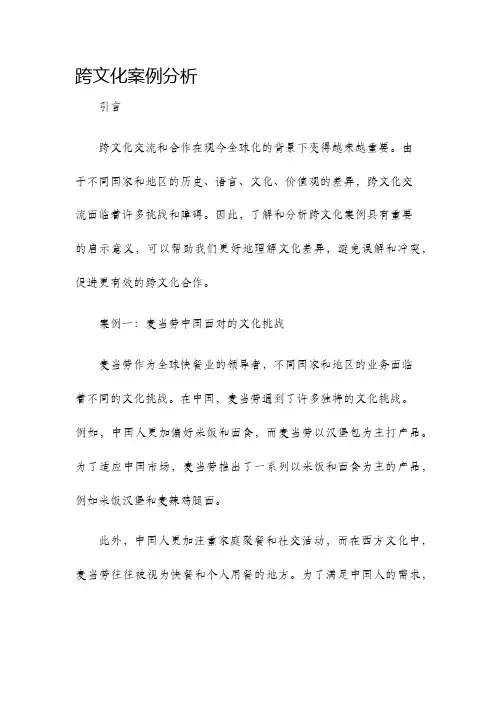
跨文化案例分析引言跨文化交流和合作在现今全球化的背景下变得越来越重要。
由于不同国家和地区的历史、语言、文化、价值观的差异,跨文化交流面临着许多挑战和障碍。
因此,了解和分析跨文化案例具有重要的启示意义,可以帮助我们更好地理解文化差异,避免误解和冲突,促进更有效的跨文化合作。
案例一:麦当劳中国面对的文化挑战麦当劳作为全球快餐业的领导者,不同国家和地区的业务面临着不同的文化挑战。
在中国,麦当劳遇到了许多独特的文化挑战。
例如,中国人更加偏好米饭和面食,而麦当劳以汉堡包为主打产品。
为了适应中国市场,麦当劳推出了一系列以米饭和面食为主的产品,例如米饭汉堡和麦辣鸡腿面。
此外,中国人更加注重家庭聚餐和社交活动,而在西方文化中,麦当劳往往被视为快餐和个人用餐的地方。
为了满足中国人的需求,麦当劳在中国开设了更多的餐厅,提供更宽敞和舒适的环境,以促进家庭和社交聚餐的氛围。
通过对中国文化的深入了解和适应,麦当劳在中国市场取得了巨大成功。
这个案例告诉我们,跨文化合作需要对目标文化有深入的了解,并制定相应的策略来适应和满足目标文化的需求。
案例二:日本和美国企业的管理差异日本和美国企业在管理风格上存在着明显的差异。
例如,在决策过程中,日本企业更加注重集体决策和共识,而美国企业更加强调个人决策和权力分配。
这种差异在日本和美国企业合作的过程中可能会导致冲突和摩擦。
另一个重要的差异是对员工价值观的认可。
日本企业更加注重员工的忠诚和集体利益,通常提供长期稳定的职位和福利。
而美国企业更加注重员工的个人发展和自由度,通常提供更高的薪酬和激励机制。
当日本和美国企业合作时,必须明确这些差异,并进行有效的沟通和协调。
案例三:跨国企业的文化融合在跨文化合作中,跨国企业面临着将不同的文化融合在一起的挑战。
例如,当一家美国公司并购一家中国公司时,两个公司可能具有不同的价值观、组织文化和工作方式。
为了实现文化融合,跨国企业需要进行有效的沟通和交流,建立共同的价值观和工作标准。
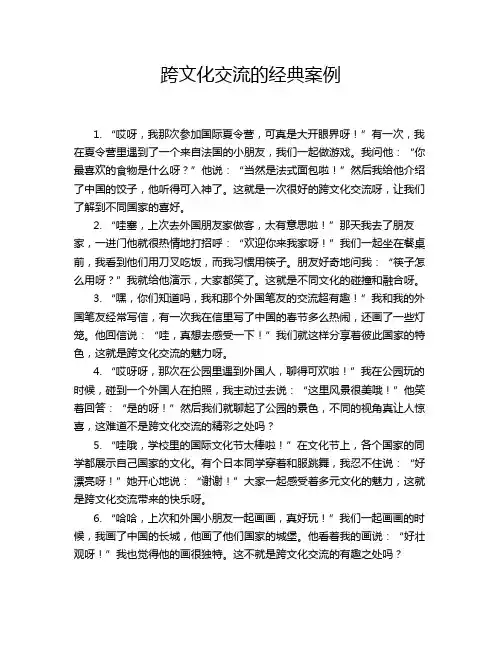
跨文化交流的经典案例1. “哎呀,我那次参加国际夏令营,可真是大开眼界呀!”有一次,我在夏令营里遇到了一个来自法国的小朋友,我们一起做游戏。
我问他:“你最喜欢的食物是什么呀?”他说:“当然是法式面包啦!”然后我给他介绍了中国的饺子,他听得可入神了。
这就是一次很好的跨文化交流呀,让我们了解到不同国家的喜好。
2. “哇塞,上次去外国朋友家做客,太有意思啦!”那天我去了朋友家,一进门他就很热情地打招呼:“欢迎你来我家呀!”我们一起坐在餐桌前,我看到他们用刀叉吃饭,而我习惯用筷子。
朋友好奇地问我:“筷子怎么用呀?”我就给他演示,大家都笑了。
这就是不同文化的碰撞和融合呀。
3. “嘿,你们知道吗,我和那个外国笔友的交流超有趣!”我和我的外国笔友经常写信,有一次我在信里写了中国的春节多么热闹,还画了一些灯笼。
他回信说:“哇,真想去感受一下!”我们就这样分享着彼此国家的特色,这就是跨文化交流的魅力呀。
4. “哎呀呀,那次在公园里遇到外国人,聊得可欢啦!”我在公园玩的时候,碰到一个外国人在拍照,我主动过去说:“这里风景很美哦!”他笑着回答:“是的呀!”然后我们就聊起了公园的景色,不同的视角真让人惊喜,这难道不是跨文化交流的精彩之处吗?5. “哇哦,学校里的国际文化节太棒啦!”在文化节上,各个国家的同学都展示自己国家的文化。
有个日本同学穿着和服跳舞,我忍不住说:“好漂亮呀!”她开心地说:“谢谢!”大家一起感受着多元文化的魅力,这就是跨文化交流带来的快乐呀。
6. “哈哈,上次和外国小朋友一起画画,真好玩!”我们一起画画的时候,我画了中国的长城,他画了他们国家的城堡。
他看着我的画说:“好壮观呀!”我也觉得他的画很独特。
这不就是跨文化交流的有趣之处吗?7. “哎呀,我跟那个外教老师的互动好难忘!”外教老师上课特别有趣,有一次他讲他们国家的节日,我们都听得津津有味。
我举手问:“和我们的节日有什么不同呢?”他详细地给我们解释,让我们了解到更多,这就是跨文化交流的意义呀。
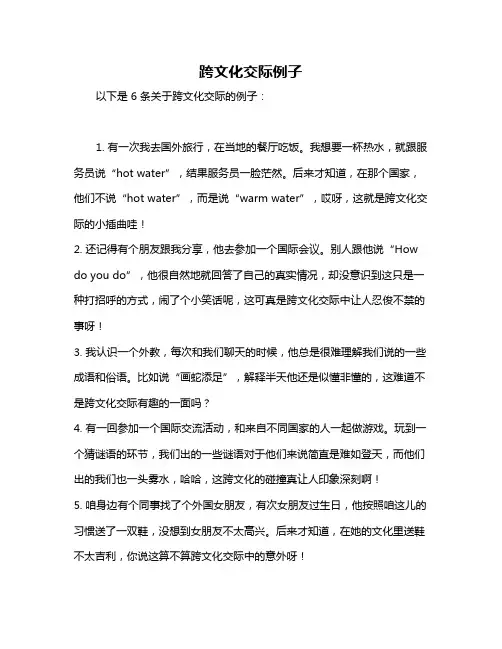
跨文化交际例子
以下是 6 条关于跨文化交际的例子:
1. 有一次我去国外旅行,在当地的餐厅吃饭。
我想要一杯热水,就跟服务员说“hot water”,结果服务员一脸茫然。
后来才知道,在那个国家,他们不说“hot water”,而是说“warm water”,哎呀,这就是跨文化交际的小插曲哇!
2. 还记得有个朋友跟我分享,他去参加一个国际会议。
别人跟他说“How do you do”,他很自然地就回答了自己的真实情况,却没意识到这只是一种打招呼的方式,闹了个小笑话呢,这可真是跨文化交际中让人忍俊不禁的事呀!
3. 我认识一个外教,每次和我们聊天的时候,他总是很难理解我们说的一些成语和俗语。
比如说“画蛇添足”,解释半天他还是似懂非懂的,这难道不是跨文化交际有趣的一面吗?
4. 有一回参加一个国际交流活动,和来自不同国家的人一起做游戏。
玩到一个猜谜语的环节,我们出的一些谜语对于他们来说简直是难如登天,而他们出的我们也一头雾水,哈哈,这跨文化的碰撞真让人印象深刻啊!
5. 咱身边有个同事找了个外国女朋友,有次女朋友过生日,他按照咱这儿的习惯送了一双鞋,没想到女朋友不太高兴。
后来才知道,在她的文化里送鞋不太吉利,你说这算不算跨文化交际中的意外呀!
6. 曾经在一部外国电影里看到,男主去女方家做客,按照自己国家的习惯大大咧咧地坐在沙发上,却没注意到在那个国家这是不礼貌的行为。
哎呀呀,跨文化交际就是这么充满未知呢!
观点结论:跨文化交际真是充满了各种意想不到和有趣的事情,需要我们不断学习和理解不同文化的差异呀!。
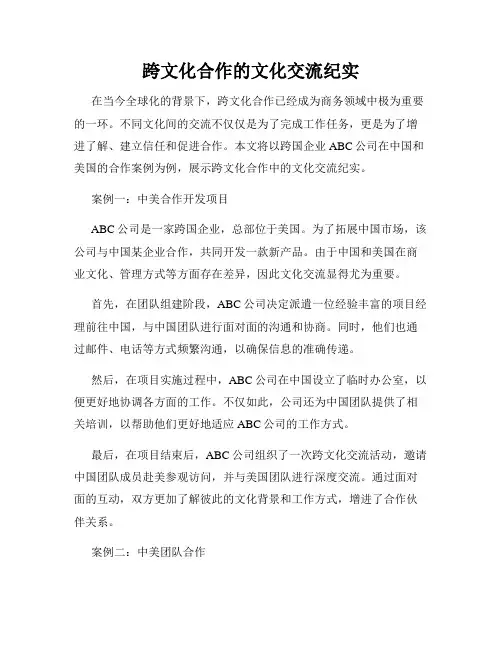
跨文化合作的文化交流纪实在当今全球化的背景下,跨文化合作已经成为商务领域中极为重要的一环。
不同文化间的交流不仅仅是为了完成工作任务,更是为了增进了解、建立信任和促进合作。
本文将以跨国企业ABC公司在中国和美国的合作案例为例,展示跨文化合作中的文化交流纪实。
案例一:中美合作开发项目ABC公司是一家跨国企业,总部位于美国。
为了拓展中国市场,该公司与中国某企业合作,共同开发一款新产品。
由于中国和美国在商业文化、管理方式等方面存在差异,因此文化交流显得尤为重要。
首先,在团队组建阶段,ABC公司决定派遣一位经验丰富的项目经理前往中国,与中国团队进行面对面的沟通和协商。
同时,他们也通过邮件、电话等方式频繁沟通,以确保信息的准确传递。
然后,在项目实施过程中,ABC公司在中国设立了临时办公室,以便更好地协调各方面的工作。
不仅如此,公司还为中国团队提供了相关培训,以帮助他们更好地适应ABC公司的工作方式。
最后,在项目结束后,ABC公司组织了一次跨文化交流活动,邀请中国团队成员赴美参观访问,并与美国团队进行深度交流。
通过面对面的互动,双方更加了解彼此的文化背景和工作方式,增进了合作伙伴关系。
案例二:中美团队合作ABC公司决定在美国设立分公司,与中国总部进行跨文化合作。
为了顺利推进合作项目,双方进行了大量的文化交流。
首先,ABC公司在分公司设立了一个文化培训小组,负责向美国团队传授中国文化和商务礼仪等方面的知识。
通过培训,美国团队对中国文化有了更深入的了解,避免了文化冲突和误解。
其次,分公司和总部之间进行了频繁的视频会议和电话沟通,以确保信息的及时传递和沟通的顺畅。
双方通过共享屏幕、文件共享等工具,促进了协作效率。
此外,ABC公司还组织了一次全员旅游活动,将分公司和总部的员工聚集在一起,进行团建和文化交流。
通过此次活动,员工们加深了对彼此文化的了解,同时也增强了团队凝聚力和合作意愿。
结论以上案例展示了跨文化合作中的文化交流纪实。
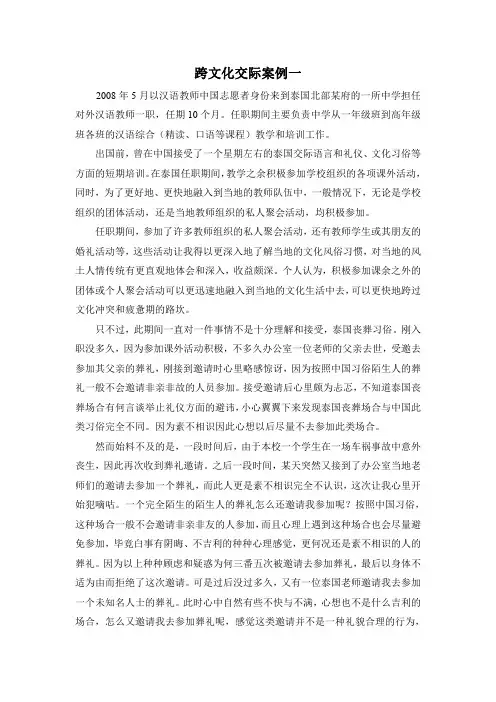
跨文化交际案例一2008年5月以汉语教师中国志愿者身份来到泰国北部某府的一所中学担任对外汉语教师一职,任期10个月。
任职期间主要负责中学从一年级班到高年级班各班的汉语综合(精读、口语等课程)教学和培训工作。
出国前,曾在中国接受了一个星期左右的泰国交际语言和礼仪、文化习俗等方面的短期培训。
在泰国任职期间,教学之余积极参加学校组织的各项课外活动,同时,为了更好地、更快地融入到当地的教师队伍中,一般情况下,无论是学校组织的团体活动,还是当地教师组织的私人聚会活动,均积极参加。
任职期间,参加了许多教师组织的私人聚会活动,还有教师学生或其朋友的婚礼活动等,这些活动让我得以更深入地了解当地的文化风俗习惯,对当地的风土人情传统有更直观地体会和深入,收益颇深。
个人认为,积极参加课余之外的团体或个人聚会活动可以更迅速地融入到当地的文化生活中去,可以更快地跨过文化冲突和疲惫期的路坎。
只不过,此期间一直对一件事情不是十分理解和接受,泰国丧葬习俗。
刚入职没多久,因为参加课外活动积极,不多久办公室一位老师的父亲去世,受邀去参加其父亲的葬礼,刚接到邀请时心里略感惊讶,因为按照中国习俗陌生人的葬礼一般不会邀请非亲非故的人员参加。
接受邀请后心里颇为忐忑,不知道泰国丧葬场合有何言谈举止礼仪方面的避讳,小心翼翼下来发现泰国丧葬场合与中国此类习俗完全不同。
因为素不相识因此心想以后尽量不去参加此类场合。
然而始料不及的是,一段时间后,由于本校一个学生在一场车祸事故中意外丧生,因此再次收到葬礼邀请。
之后一段时间,某天突然又接到了办公室当地老师们的邀请去参加一个葬礼,而此人更是素不相识完全不认识,这次让我心里开始犯嘀咕。
一个完全陌生的陌生人的葬礼怎么还邀请我参加呢?按照中国习俗,这种场合一般不会邀请非亲非友的人参加,而且心理上遇到这种场合也会尽量避免参加,毕竟白事有阴晦、不吉利的种种心理感觉,更何况还是素不相识的人的葬礼。
因为以上种种顾虑和疑惑为何三番五次被邀请去参加葬礼,最后以身体不适为由而拒绝了这次邀请。
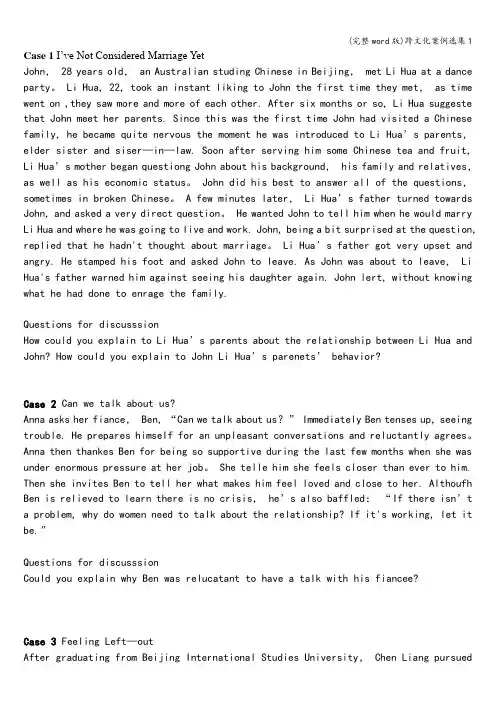
Case 1I’ve Not Considered Marriage YetJohn, 28 years old, an Australian studing Chinese in Beijing, met Li Hua at a dance party。
Li Hua, 22, took an instant liking to John the first time they met, as time went on ,they saw more and more of each other. After six months or so, Li Hua suggeste that John meet her parents. Since this was the first time John had visited a Chinese family, he became quite nervous the moment he was introduced to Li Hua’s parents,elder sister and siser—in—law. Soon after serving him some Chinese tea and fruit, Li Hua’s mother began questiong John about his background, his family and relatives,as well as his economic status。
John did his best to answer all of the questions,sometimes in broken Chinese。
A few minutes later,Li Hua’s father turned towards John, and asked a very direct question。
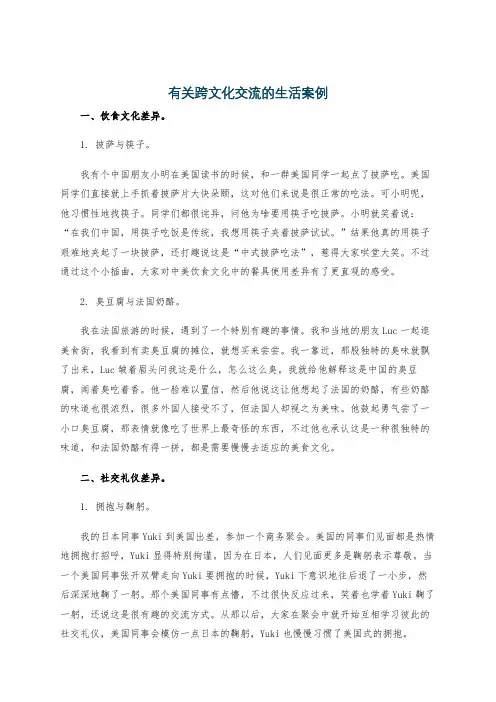
有关跨文化交流的生活案例一、饮食文化差异。
1. 披萨与筷子。
我有个中国朋友小明在美国读书的时候,和一群美国同学一起点了披萨吃。
美国同学们直接就上手抓着披萨片大快朵颐,这对他们来说是很正常的吃法。
可小明呢,他习惯性地找筷子。
同学们都很诧异,问他为啥要用筷子吃披萨。
小明就笑着说:“在我们中国,用筷子吃饭是传统,我想用筷子夹着披萨试试。
”结果他真的用筷子艰难地夹起了一块披萨,还打趣说这是“中式披萨吃法”,惹得大家哄堂大笑。
不过通过这个小插曲,大家对中美饮食文化中的餐具使用差异有了更直观的感受。
2. 臭豆腐与法国奶酪。
我在法国旅游的时候,遇到了一个特别有趣的事情。
我和当地的朋友Luc一起逛美食街,我看到有卖臭豆腐的摊位,就想买来尝尝。
我一靠近,那股独特的臭味就飘了出来,Luc皱着眉头问我这是什么,怎么这么臭。
我就给他解释这是中国的臭豆腐,闻着臭吃着香。
他一脸难以置信,然后他说这让他想起了法国的奶酪,有些奶酪的味道也很浓烈,很多外国人接受不了,但法国人却视之为美味。
他鼓起勇气尝了一小口臭豆腐,那表情就像吃了世界上最奇怪的东西,不过他也承认这是一种很独特的味道,和法国奶酪有得一拼,都是需要慢慢去适应的美食文化。
二、社交礼仪差异。
1. 拥抱与鞠躬。
我的日本同事Yuki到美国出差,参加一个商务聚会。
美国的同事们见面都是热情地拥抱打招呼,Yuki显得特别拘谨。
因为在日本,人们见面更多是鞠躬表示尊敬。
当一个美国同事张开双臂走向Yuki要拥抱的时候,Yuki下意识地往后退了一小步,然后深深地鞠了一躬。
那个美国同事有点懵,不过很快反应过来,笑着也学着Yuki鞠了一躬,还说这是很有趣的交流方式。
从那以后,大家在聚会中就开始互相学习彼此的社交礼仪,美国同事会模仿一点日本的鞠躬,Yuki也慢慢习惯了美国式的拥抱。
2. 直呼其名与称呼头衔。
我有个德国朋友Max,他来中国工作。
在中国的公司里,他发现大家都称呼年长的同事为“张哥”“李姐”之类的,或者称呼职位头衔,像“王经理”“赵主任”。
跨文化交际真实案例
在跨文化交际中,常常会出现一些令人尴尬或不舒服的场面。
以下是一些真实的案例:
1. 在一次国际商务会议上,一位中国代表向一位美国代表赠送
了一件手工艺品作为礼物。
美国代表开心地接受了礼物,但不久后,他发现自己的中国同事对他的行为很不满意。
原来,在中国文化中,赠送礼物并不是为了表达友好,而是为了表示尊重和致谢。
因此,中国代表认为美国代表没有给予足够的尊重,只是出于礼仪接受了礼物。
2. 在一次跨国旅游团中,一位日本游客在公共场合大声咳嗽。
其他游客都很不满意,觉得他没有礼貌,但他自己并不知道。
原来,在日本文化中,咳嗽是表示尊重和谦逊的表现,而不是粗鲁的举止。
因此,他觉得自己只是在表现出自己的谦卑。
3. 在一次外国人参加的婚礼中,他们发现自己不知道应该如何
祝福新人。
他们试图用自己的方式表达祝福,但很显然,这并不是新人期望听到的。
原来,在不同的文化中,祝福和庆祝的方式是不同的。
在一些文化中,人们可能会用食物、礼物或其他方式表达祝福,而在其他文化中,人们会用言语或身体语言表达祝福。
这些案例表明,在跨文化交际中,我们需要更好地了解不同文化背景下的语言和行为习惯,以避免尴尬和误解。
通过学习和理解,我们可以更好地融入其他文化,建立更好的关系。
- 1 -。
跨文化冲突案例
在全球化时代,跨文化交流越来越频繁,但由于不同文化背景和价值观的差异,跨文化冲突也时有发生。
以下是几个跨文化冲突案例: 1. 一位美国人到中国出差,他在会议上提出了自己的看法和建议,但很快发现中国人不太愿意接受他的建议。
这是因为在中国文化中,尊重长辈和权威是很重要的,而这位美国人并没有考虑到这一点。
2. 一位日本商人到美国出差,他在会议上提出了一个项目,但美国人对他的计划表示怀疑并提出了很多批评意见。
这是因为在日本文化中,遵守规则和传统是很重要的,而这位日本商人并没有考虑到美国文化中的创新和改进。
3. 一位印度人到德国工作,他发现德国人很注重时间和效率,但他自己习惯了印度文化中的慢节奏和强调人际关系。
这导致他在工作中遇到了很多问题,因为他不能适应德国文化的快节奏和直接沟通方式。
以上案例表明,跨文化冲突是不可避免的,但我们可以通过了解和尊重不同文化的差异,以及灵活适应不同文化的方式来最大限度地减少冲突的发生。
- 1 -。
Case One About Table Manners案例:Sarah and Daniel are a young American couple who are teaching English at Zhejiang University。
They are leaning Chinese and enjoy their new lives。
They have been eager to get to know Chinese people better so were pleased wh en Chen’ Li, their new Chinese colleague invited them to her home for dinner at one weekend: When Sarah:and Dahiel arrived,Chen Li introduced them to her husband Wang Bing,asked them to sit down at a table containing 8 plates of various cold dishes served them tea and then disappeared with her husband into the kitchen. Sarah offered to help in the kitchen but Chen Li said she didn't need any help。
A half-hour later she came back and sat down and the three began to eat. Wang Bing came in from time to time to put several hot dishes on the table. Most of the food was wonderful and there was much more than Sarah and Daniel could eat。
中西方跨文化交际的案例一、饮食文化方面。
1. 火锅与西餐。
我有个中国朋友小明去国外留学,在学校里交了个美国朋友杰克。
有一次,小明热情地邀请杰克去吃中国火锅。
杰克一进火锅店就被那热闹的氛围搞懵了。
当服务员端上锅底,各种生的食材,像毛肚、鸭肠、肥牛卷之类的,杰克瞪大了眼睛。
他平时吃西餐,牛排啥的都是煎得好好的端上来。
小明不停地把食材往锅里涮,还热情地给杰克夹菜,说:“这个毛肚啊,七上八下就可以吃了,可嫩了。
”杰克看着那在锅里翻腾的毛肚,犹豫了好久才放进嘴里,然后被那独特的口感惊到了。
而杰克呢,后来回请小明去吃西餐。
小明看着那一小份一小份精致摆盘的食物,心想这哪够吃啊。
他拿起刀叉,感觉特别别扭,不像用筷子那么顺手,还不小心把牛排切得满盘子都是汁水,两个人看着彼此的窘态都哈哈大笑起来。
2. 茶文化与咖啡文化。
有个中国的商务代表团去英国谈合作。
谈判休息期间,英国方面的负责人请中国客人喝咖啡。
对于英国人来说,咖啡是日常社交饮品,他们优雅地拿着咖啡杯,小抿一口,谈论着咖啡的产地和风味。
而中国代表团里有个刘先生,他是个老茶客,平时就爱喝茶。
他看着那一小杯咖啡,心里嘀咕着“这哪有茶喝着舒坦”。
于是他就从包里拿出一小包自己带的茶叶,问英国人有没有热水可以泡茶。
英国人一脸惊讶,他们没想到中国人这么爱喝茶,在他们的概念里,咖啡才是正式的社交饮品。
刘先生就开始给英国人介绍中国的茶文化,从茶叶的种类到泡茶的讲究,什么“春茶最香,不同的茶要用不同的水温泡”之类的。
英国人听着觉得特别新奇,这就像他们对不同咖啡豆烘焙程度的讲究一样,双方因为饮品文化的交流,关系也变得更加融洽了。
二、社交礼仪方面。
1. 见面礼仪。
我的同事小赵去法国出差。
在一个商务会议上,他遇到了很多法国的合作伙伴。
小赵习惯了中国人见面握手的方式,所以他见到法国同事的时候就热情地伸出手去握手。
可是有些法国女士,按照法国的礼仪习惯,是行贴面礼的。
这就有点尴尬了,有个法国女同事愣了一下,然后笑着先和小赵握了手,然后又侧过脸来轻轻贴了一下,还开玩笑地说:“你这个中国的热情握手和我们法国的贴面礼结合得很特别呢。
跨文化交际真实案例跨文化交际真实案例:探索不同文化之间的交流与理解一、西方与东方的餐桌礼仪之差异我曾经参加过一次跨文化交流活动,在一次晚宴上,我注意到一位西方朋友用刀叉将食物切得很小,然后用刀叉一起送入口中。
而我习惯用筷子夹起整块食物放入嘴中。
我很好奇为什么他们要把食物切得这么小,于是我问了他。
他解释说,这是因为西方人认为将食物切得小可以更好地搭配口味,而且可以更好地控制食物的份量。
而我告诉他,中国人习惯用筷子夹起整块食物,这是因为我们认为整块食物更好地保持了食物的原汁原味,并且有助于增加食物的口感。
二、日本与中国商务谈判的文化差异我曾经参与一次中国与日本的商务谈判,双方的谈判方式和风格有很大的差异。
在中国,我们习惯通过直接表达自己的需求和观点来进行谈判,而且我们喜欢通过争论和辩论来达成共识。
然而,在日本,他们更加注重和谐和面子,他们倾向于通过间接的方式来表达自己的需求和观点,而且他们更注重建立良好的关系和信任。
在这次谈判中,由于双方对谈判方式的不同理解,导致了一些误解和摩擦。
最后,我们通过相互理解和妥协,最终达成了双方都满意的合作协议。
三、美国与中国学生在大学课堂上的表现差异在我的留学经历中,我注意到了美国与中国学生在大学课堂上的表现差异。
在美国,学生们更加注重个人的独立思考和表达,他们习惯于在课堂上提问、发表自己的观点,并且与教授进行积极的互动。
而在中国,学生们更加注重教师的权威和知识传授,他们习惯于被动地接受知识,很少有人主动提问和发表自己的观点。
这种差异导致了在美国的课堂上,我感到压力很大,需要积极主动地参与讨论和表达自己的观点。
四、法国与中国人在社交场合的交流方式我曾经在法国参加了一个社交聚会,发现法国人与中国人在社交场合的交流方式有很大的差异。
在法国,人们更加注重自由和随意,他们喜欢在社交场合中与不同的人进行交流,不论是陌生人还是朋友。
而在中国,人们更注重亲密的人际关系,他们更愿意与熟悉的人进行交流,与陌生人保持一定的距离。
跨文化场合交流成功案例案例一:跨国公司的跨文化合作一个以美国为总部的跨国公司在与一家以日本为总部的公司进行合作时,遇到了跨文化交流的挑战。
为了确保交流的成功,双方决定派出代表团进行面对面的会谈和讨论。
在会议前,代表团进行了充分的准备,包括研究了对方国家的商业礼仪和文化习俗。
美国代表团了解到日本文化注重尊重和细节,因此他们在交流时也非常注重对方的意见和感受。
在会议期间,双方代表团遵循了一些跨文化交流的成功原则。
他们尊重对方的文化习俗,包括在招待晚宴上享用日本传统美食和喝杯热茶。
他们避免直接争论和冲突,而是采取了温和的沟通方式。
他们通过提问和分享信息,以理性和逻辑的方式达成共识。
代表团对语言和表达方式的差异也进行了理解和尊重。
最终,这两家公司达成了成功的合作协议。
他们通过跨文化交流增进了相互之间的理解和信任,解决了合作中的问题,并建立了长期的商业伙伴关系。
案例二:跨文化婚姻的交流和理解李明是一个中国人,他在旅行中遇到了来自瑞典的安妮。
尽管他们来自不同的文化背景,但他们相互吸引,开始了一段跨文化的恋情。
为了确保他们的关系顺利发展,李明和安妮努力学习彼此的文化和语言。
他们互相教对方他们的母语,并详细了解彼此的家庭和传统。
他们也努力理解并尊重对方的价值观和生活方式。
当他们决定结婚时,面临了更多的跨文化挑战。
他们的家庭和朋友来自不同的文化,他们需要找到一种平衡,以便相互之间能够理解和接纳。
为了解决这些挑战,李明和安妮采取了一些措施。
他们安排了一场婚礼,融合了中式和西式的元素,以向两个家庭展示彼此的文化。
他们鼓励父母和家人进行跨文化交流和了解。
他们组织了一些家庭聚会和活动,以促进家庭成员之间的交流和互动。
通过这样的努力,李明和安妮成功实现了跨文化婚姻的交流和理解。
他们的家庭和朋友之间的关系逐渐变得融洽,他们也在相互尊重和支持中建立了稳固的婚姻基础。
Case 1I‟ve Not Considered Marriage Y etJohn, 28 years old, an Australian studing Chinese in Beijing, met Li Hua at a dance party. Li Hua, 22, took an instant liking to John the first time they met, as time went on ,they saw more and more of each other. After six months or so, Li Hua suggeste that John meet her parents. Since this was the first time John had visited a Chinese family, he became quite nervous the moment he was introduced to Li Hua‟s parents, elder sister and siser-in-law. Soon after serving him some Chinese tea and fruit, Li Hua‟s mother began questiong John about his background, his family and relatives, as well as his economic status. John did his best to answer all of the questions, sometimes in broken Chinese. A few minutes later, Li Hua‟s father turned towards John, and asked a very direct question. He wanted John to tell him when he would marry Li Hua and where he was going to live and work. John, being a bit surprised at the question, replied that he hadn‟t thought about marriage. Li Hua‟s father got very upset and angry. He stamped his foot and asked John to leave. As John was about to leav e, Li Hua‟s father warned him against seeing his daughter again. John lert, without knowing what he had done to enrage the family.Questions for discusssionHow could you expl ain to Li Hua‟s parents about the relationship between Li Hua and John? How could you expl ain to John Li Hua‟s parenets‟ behavior?Case 2 Can we talk about us?Anna asks her fiance, Ben, “Can we talk about us?” Immediately Ben tenses up, seeing trouble. He prepares himself for an unpleasant conversations and reluctantly agrees. Anna then thankes Ben for being so supportive during the last few months when she was under enormous pressure at her job. She telle him she feels closer than ever to him. Then she invites Ben to tell her what makes him feel loved and close to her. Althoufh Ben is relieved to learn there is no c risis, he‟s also baffled: “If there isn‟t a problem, why do women need to talk about the relationship? If it‟s wor king, let it be.”Questions for discusssionCould you explain why Ben was relucatant to have a talk with his fiancee?Case 3 Feeling Left-outAfter graduating from Beijing International Studies University, Chen Liang pursued an MA program at a university in Boston ,the U.S. Eatly in the same program, he made friends with some of the American students studying in the same program. One day after class, his American friend, Dick, asked Chen to join his in the university cafeteria. On their way they ran in to Dick‟s girlfriend, Lisa, who was on her way to a lecture. Walking shoulder to shoulder, Dick and Lisa carried on an intimate conversation, as if they hadn‟t seen each other for ages. Meanwhile, Chen Liang was walking behind them, not taking part in the conversation. When they were nearing the cafeteria Lisa said she had to leave for the lecture. Dick embraced her and gave her a long and passinate kiss. Seeing this, Chen turned away and walked off toward the cafeteria. When Dick looked up, he saw Chen walking into the cageteria. Dick was puzzled as to why Chen didn‟t wait for his, and went to the cafeteria alone.Questions for discusssionCould you explain to Dick why Chen Liang walked into the cafeteria without waiting for him?Case 4 Shoes for Street WalkingIt is said that in Rome, in front of a shoe store, there was such a sign to attract English-speaking customers: Shoes for street walking. Come in and have a fit. The sign caught the attention of many English-speaking tourists, but not to look at the shoes displayed in the windows, but to read the sign and then break out into laughter. The Italian shop owner did not realize that “a street walker” means a prostitute, while “to have a fit” does not mean to have a try, but to become suddenly and viol ently angry or upset. No wonder the amusement and laughter!(Deng Y anchang et al.,1989)Question for discussionWhy did the Italian shop owner make such a blunder?Case 5 A Misunderstanding Caused by a JokeRoger was the Personnel Executive of a large American multinational firm. In 1996, Roger was working in Brazil to help promote their business. One evening, there was a party, attended by both his employees from the United States and many Brazilian business people. At the party, Roger bumped into Rosalita, a Brazilianwoman he had known for some time. Roger generally had a very good impression of Rosalita and always felt at ease with her, so that he felt free to tell jokes and share personal thoughts, and talk about Brazil and Brazilian life without having the jitters of offending Rosalita. During the party, Rosalita said to Roger, “I‟d like to introduce you to one of my good friends. She is a very capable woman and is presently thinking of working in a joint venture so she can provide a better living for her large family. She is very much interested in your company.” Hearing that, Roger smiled and replied, “OK, but I just hope I don‟t get hustled.” Unfortunately, Roger‟s reply made Rosalita quite upset. V ery soon she excused herself as politely as she could, and did not speak with Roger for the rest of the evening.Question for discussionRoger was confused by Rosalita‟s behavior. Could you give him an explanation?Case 6 Look Out!A foreign student in the U.S. was sitting by a window reading a book. She heard someone yelling “Look out!” , so she stuck her head out of the window. Just then a board hurtled down from above, narrowly missing her. She looked up, half in anger and half in fright. There was a man on the roof doing repairs. “Didn‟t you hea r me call …Look out‟?” he demanded. “Y es, and that‟s what I did,” she replied.Questions for discussionIn this case, what does “look out”mean? Could you give a similar case like this?Case7Different Attitudes Toward a Fly in a BeerIf in the dining hall, a fly was seen in a glass of beer, an Englishman would say, “May I have another,please?”; a Frenchman would pour the beer out; a Spanish man would put the money on the table and leave without a word; a Japanese would summon the manager and criticiz e, “Do you do all your business like this?”; an Arab would give the beer to the waiter and say, “I‟ll buy you a drink.”; and the more humorous American would say to the waiter, “Please serve the fly and beer separately. If the customer likes the fly, he co uld put it into his beer himself.”Case 8Borrow Money and Lend MoneyWhile I was studying in America, I met an American classmate named Jimmy. One day I was eager to buy a book, but I did not have enough money, so I borrowed three dollars from him. Before he lent me the three dollars, Jimmy asked me three times, “Are you sure you will return the money to me?” Four days later, he kept reminding me about the loan until I paid him back the money.Interestingly enough, weeks later he borrowed $30 from me and said he would pay me back in a week. After one month, there was no sign of the money so I reminded him. To my surprise, he said, “I‟m sorry, why didn‟t you remind me earlier?” and returned the money instantly.Americans don‟t readily give money to others nor receive others‟ readily. If you lent money to an American generously, and said, “Don‟t mention it again. Y ou don‟t have to pay me back.” , he would be angry and think you were looking down on him, not believing his ability to repay the money.Case 9Twelve Cups of TeaWhen I first went to Hong Kong, I had no idea about Chinese tea-drinking and found myself caught in a very awkward situation. I visited a Chinese family and was immediately given a cup of tea. I was not thirsty and I did not particularly like that type of tea, but out of politeness I finished the cup. But the more I drank, the more I was given. I kept insisting that I did not want any more, but the host took no notice. I drank about twelve cups of tea that afternoon! The host must have thought that I was very greedy, but I did not know how to avoid getting more tea poured. (Helen Oatey, 1988)Case 10Have you had your lunch?Where are you going?When I first went to Hong Kong a number of years ago, I had no idea about the Chinese language or the Chinese culture. Shortly after my arrival, I went to the bank on my way to school. I was extremely surprised when the bank clerk asked me if I had had lunch. In British culture, the question would be regarded as an indirect invitation to lunc h, and between unmarried young people it indicates a young man‟s interest in dating a girl. Since he was a completely stranger, I was quite taken aback. I proceeded to school and was even more surprised when one of the teachers asked me the same question. By now I realized that it could not be an invitation, but I was puzzled as to why they kept asking it. In the following days, as I was asked the question again andagain, I came to the conclusion that people must be concerned about my health. I was somewhat underweight, and I assumed they must be worried that I was not eating properly. Only later, did I find out that the question had no real significance at all, it was merely a greeting.Case11Li Hongzhang‟s EmbarrassmentLi Hongzhang, one of the top officials in the Qing Dynasty, was invited to visit the United States. He was warmly welcomed. One day, Li was hosting a banquet for the American officials in a popular restaurant. As the banquet started, according to the Chinese custom, Li stood up and said, “I am very happy to have all of you here today. Though these dishes are coarse and not delicious and good enough to show my respect for you, I hope you will enjoy them…” (今天承蒙各位光临,不胜荣幸。